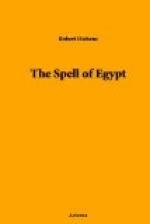Many years ago in London I went to the private view of the Royal Academy at Burlington House. I went in the afternoon, when the galleries were crowded with politicians and artists, with dealers, gossips, quidnuncs, and flaneurs; with authors, fashionable lawyers, and doctors; with men and women of the world; with young dandies and actresses en vogue. A roar of voices went up to the roof. Every one was talking, smiling, laughing, commenting, and criticizing. It was a little picture of the very worldly world that loves the things of to-day and the chime of the passing hours. And suddenly some people near me were silent, and some turned their heads to stare with a strangely fixed attention. And I saw coming toward me an emaciated figure, rather bent, much drawn together, walking slowly on legs like sticks. It was clad in black, with a gleam of color. Above it was a face so intensely thin that it was like the face of death. And in this face shone two eyes that seemed full of—the other world. And, like a breath from the other world passing, this man went by me and was hidden from me by the throng. It was Cardinal Manning in the last days of his life.
The face of the king is like his, but it has an even deeper pathos as it looks upward to the rock. And the king’s silence bids you be silent, and his immobility bids you be still. And his sad, and unutterable resignation sifts awe, as by the desert wind the sand is sifted into the temples, into the temple of your heart. And you feel the touch of time, but the touch of eternity, too. And as, in that rock-hewn sanctuary, you whisper “Pax vobiscum,” you say it for all the world.
XIV
EDFU
Prayer pervades the East. Far off across the sands, when one is traveling in the desert, one sees thin minarets rising toward the sky. A desert city is there. It signals its presence by this mute appeal to Allah. And where there are no minarets—in the great wastes of the dunes, in the eternal silence, the lifelessness that is not broken even by any lonely, wandering bird—the camels are stopped at the appointed hours, the poor, and often ragged, robes are laid down, the brown pilgrims prostrate themselves in prayer. And the rich man spreads his carpet, and prays. And the half-naked nomad spreads nothing; but he prays, too. The East is full of lust and full of money-getting, and full of bartering, and full of violence; but it is full of worship—of worship that disdains concealment, that recks not of ridicule or comment, that believes too utterly to care if others disbelieve. There are in the East many men who do not pray. They do not laugh at the man who does, like the unpraying Christian. There is nothing ludicrous to them in prayer. In Egypt your Nubian sailor prays in the stern of your dahabiyeh; and your Egyptian boatman prays by the rudder of your boat; and your black donkey-boy prays behind a red rock in the sand; and your camel-man prays when you are resting in the noontide, watching the far-off quivering mirage, lost in some wayward dream.




